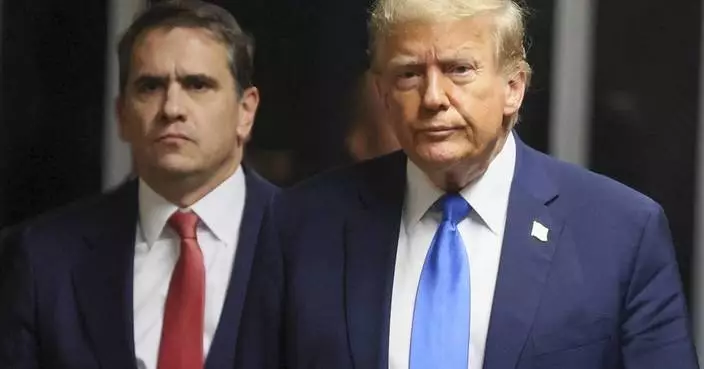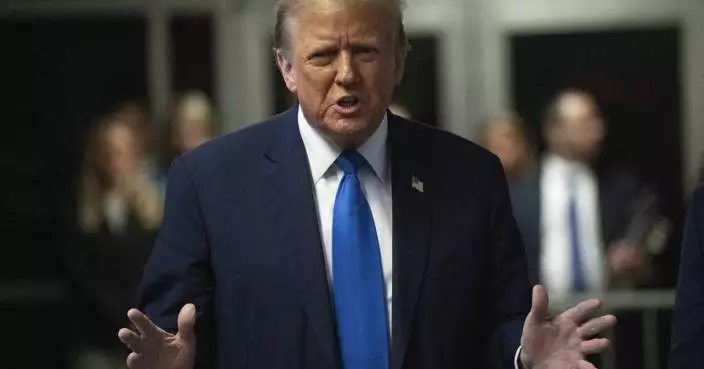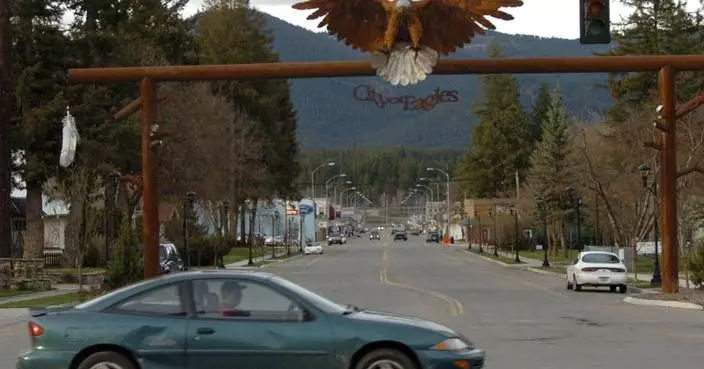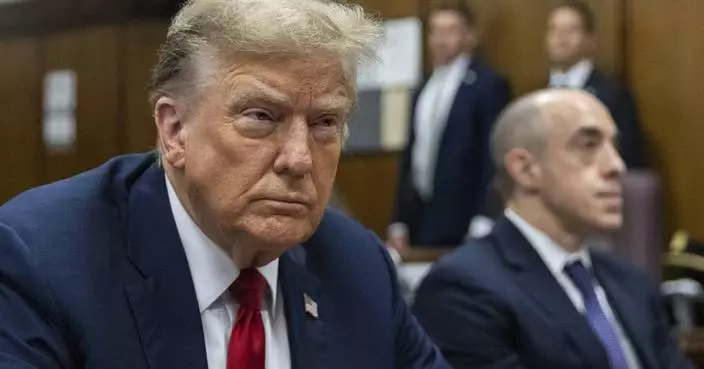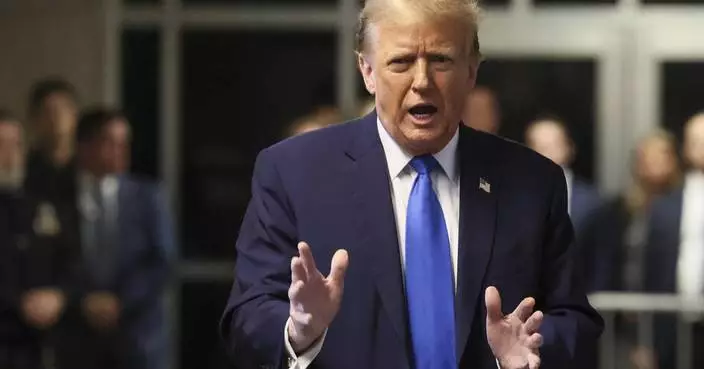Several prominent lawyers asked to help represent President Donald Trump in the last year have spurned the assignment at least partly out of concerns he wouldn't pay his bills and doesn't listen to legal advice, according to people familiar with the conversations.
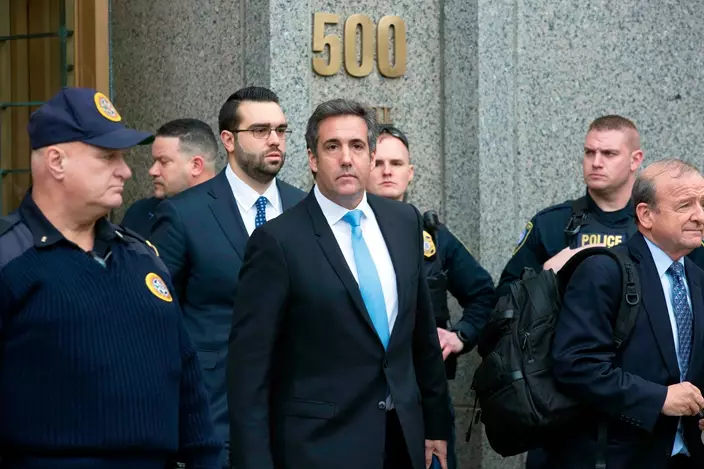
In this April 16, 2018, photo, Michael Cohen, center, President Donald Trump's personal attorney, leaves federal court in New York. (AP Photo/Mary Altaffer)
The result is that as investigators intensify their focus on the president's inner circle, including his personal lawyer, Trump has been left with a lean legal team that has struggled to add criminal defense firepower. Though more lawyers may come aboard soon, Trump has time and again struck out in landing some of Washington's most notable attorneys. The extra help may be especially needed in the critical months ahead, as special counsel Robert Mueller seeks an interview with Trump and reaches conclusions on whether the president engaged in obstruction of justice.
That Trump does not have multiple brand-name criminal defense lawyers is startling since, in ordinary circumstances, representing the president in a hugely consequential legal fight would be a dream assignment. President Bill Clinton, for instance, was navigated through the Whitewater scandal by lawyers from Williams & Connolly, one of Washington's most highly regarded firms.
At least one lawyer who was approached but rejected the opportunity made clear that he'd expect Trump to refrain from discussing the investigation on social media, according to a lawyer familiar with the exchange who spoke on condition of anonymity to discuss confidential client matters. That admonition has apparently gone unheeded.
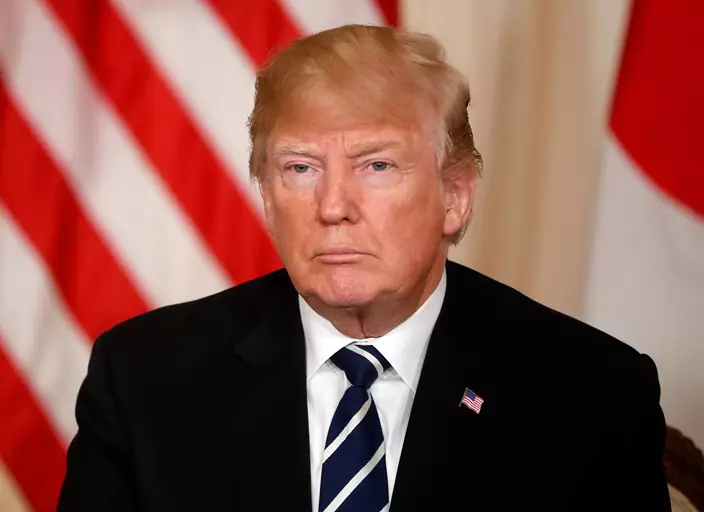
President Donald Trump listens during a meeting with Japanese Prime Minister Shinzo Abe sat Trump's private Mar-a-Lago club, Tuesday, April 17, 2018, in Palm Beach, Fla. (AP Photo/Pablo Martinez Monsivais)
In at least one other case, a major law firm that contemplated an overture to one of its lawyers was turned off by the idea of a "client who attacks the essence of our legal system" and concern that "he treats his lawyers like vendors he can avoid paying," according to one person at the firm who also spoke on condition of anonymity to discuss confidential client matters.
That perception arises from a multitude of lawsuits Trump and his business entities have faced from lawyers, real estate brokers and others over unpaid bills. Just one example: A Florida golf club owned by Trump recently agreed to a multimillion-dollar settlement with former members who said the club refused to refund their deposits.
"Obviously this is an unusual situation because it's perfectly obvious that Mr. Trump likes to be his own lawyer, and lawyers have to be concerned about their own reputation. And I'm sure that factors into their thinking," said Bill Jeffress, once part of President Richard Nixon's legal team.
On any lawyer's mind, Jeffress said: "Are your statements to the prosecutors going to be undercut by your client's tweet the next morning?"
Aside from any personal misgivings, many law firms already represent witnesses in the Mueller investigation and would have untenable conflicts in representing Trump, too. Practically speaking, a bank or financial institution that can guarantee multimillion-dollar payments to a law firm often makes for a more desirable client than an individual with more limited resources.
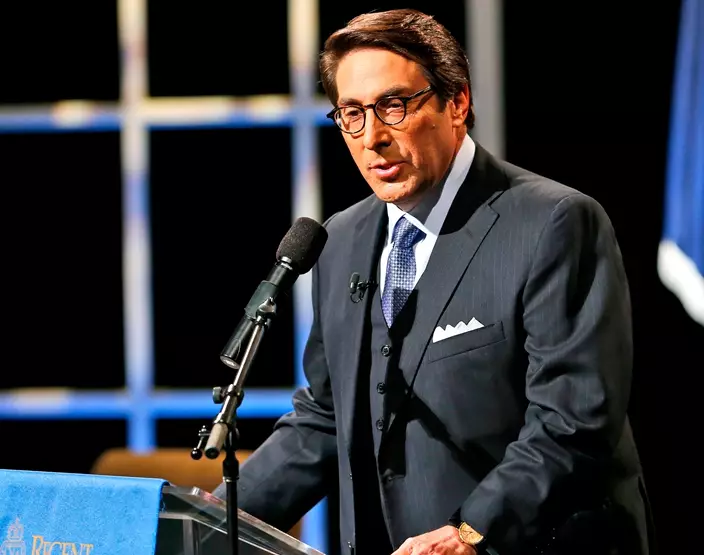
FILE - In this Oct. 23, 2015, file photo, Jay Sekulow speaks at Regent University in Virginia Beach, Va. Lawyers who have been asked to help represent President Donald Trump have spurned the assignment at least partly out of concerns he wouldn’t pay his bills and doesn’t listen to legal advice. (AP Photo/Steve Helber, File)
Trump's legal team is led by Jay Sekulow, a conservative lawyer and radio talk show host with deep experience in constitutional law and in arguing religious liberty cases before the Supreme Court. He says that experience is essential because he believes the case against Trump turns on core constitutional, rather than criminal, questions.
Sekulow has been assisted by other lawyers with ties to the American Center for Law and Justice, but also works closely with Ty Cobb, a former prosecutor with criminal defense experience who for months has represented the White House in its dealings with Mueller's team.
Other lawyers do work for Trump, too, and the Russia team could well grow in coming weeks.
Still, Trump's legal team has been marked by evolving strategies and turmoil in the last year.
It was initially led by Marc Kasowitz, a hard-charging New York lawyer who has long been in Trump's corner but is better known for commercial litigation than criminal defense. The initial strategy involved pushing back hard against Mueller's investigation, including by researching potential conflicts on Mueller's team that could be used to seek his disqualification.
But he took on a reduced role in favor of John Dowd, an experienced criminal defense lawyer who, despite having once extended a middle finger to a reporter who approached him outside a courthouse, had for a period advocated a more conciliatory approach. Yet he raised eyebrows last month with a written statement calling for Mueller's probe to be shut down.
Dowd abruptly left after Trump tried to bring aboard Joe diGenova, a former U.S. attorney and TV pundit who has advocated firing Deputy Attorney General Rod Rosenstein. But that plan was stymied because of diGenova's conflicts — his law office represents other witnesses in the Mueller investigation, including Mark Corallo, a former spokesman for the Trump legal team.
Among other heavyweight lawyers who've been considered are Reid Weingarten, who's represented executives from BP and WorldCom, and A.B. Culvahouse, the White House counsel to President Ronald Reagan. Dan Webb, a former U.S. attorney who's represented General Electric and Philip Morris, passed because of a business conflict.
Ted Olson, one of the country's best-known lawyers and a former solicitor general who, among other matters, argued the Bush v. Gore Supreme Court case and a landmark California same-sex marriage case, was contacted last year and more recently. His firm passed both times.
That firm, Gibson, Dunn and Crutcher, also represents the political opposition research firm behind a dossier of allegations of Trump's ties to Russia.
Any client benefits from lawyers with criminal defense savvy and experience negotiating with prosecutors in complex investigations, said George Washington University law professor Stephen Saltzburg.
"In theory, it shouldn't matter," he said. "Any lawyer should be able to negotiate, but in practice, people who know which buttons to push negotiate a lot better."
WASHINGTON (AP) — Former President Donald Trump faces serious charges in two separate cases over whether he attempted to subvert the Constitution by overturning the results of a fair election and illegally remain in power.
Yet it’s a New York case centered on payments to silence an adult film actress that might provide the only legal reckoning this year on whether he tried to undermine a pillar of American democracy.
Trump is charged in the so-called hush money case with trying to falsify business records, but it was hard to tell that as the trial opened Monday.
Lead prosecutor Matthew Colangelo wasted little time during opening statements tying the case to Trump's campaigning during his first run for the presidency. He said the payments made to Stormy Daniels amounted to "a criminal scheme to corrupt the 2016 presidential election."
Whether the jury accepts that connection will be pivotal for Trump's fate. The presumptive nominee faces charges related to falsifying business records that would typically be misdemeanors unless the alleged act could be tied to another crime. Prosecutors were able to charge them as felonies because they allege that the false records were part of an effort to cover up state and federal election law violations — though that’s still not the type of direct election interference that Trump is charged with elsewhere.
Trump himself has referred to the New York trial and the three other criminal cases against him as a form of election interference, suggesting without evidence that they're part of a Democratic plan to undermine his campaign to return to the White House.
“I’m here instead of being able to be in Pennsylvania and Georgia and lots of other places campaigning, and it’s very unfair,” he told reporters before Monday's court session.
While the charges are felonies, the New York case is seen as the least consequential against the former president. In the two election cases, Trump is accused of more direct involvement in trying to overturn the results of the 2020 election.
He faces a four-count federal indictment in Washington, D.C., in connection with his actions in the run-up to the violent attack on the U.S. Capitol by his supporters on Jan. 6, 2021. He and others were charged in Georgia with violating the state’s anti-racketeering law by scheming to illegally overturn his 2020 loss to Joe Biden. He has pleaded not guilty to all the charges against him in those cases and a fourth charging him with mishandling classified documents.
All the other cases are tied up in appeals that are expected to delay any trials until after the November election. If that happens, the New York case will stand as the only legal test during the campaign of whether Trump attempted to illegally manipulate an election — and the case isn't even about the election results he tried to overthrow.
On Monday, Trump's attorney quickly moved to undercut the idea that a case in which the charges center on record-keeping could seriously be considered an effort to illegally undermine an election.
“I have a spoiler alert: There’s nothing wrong with trying to influence an election. It’s called democracy,” said his attorney, Todd Blanche. “They put something sinister on this idea, as if it’s a crime. You’ll learn it’s not.”
Some legal experts monitoring the cases against Trump said they were skeptical of connecting the payments to a form of “election interference.” Doing so also runs the risk of diminishing the gravity of the other charges in the public mind.
Richard Painter, a University of Minnesota Law School professor and former associate White House counsel during the George W. Bush administration, said he believed the facts of the case met the evidence needed to determine whether a felony had been committed that violated campaign law, but added, “The election interference part, I have a little bit of trouble on this.”
Richard Hasen, a UCLA law school professor, said the New York case does not compare to the other election-related charges Trump faces.
“We can draw a fairly bright line between attempting to change vote totals to flip a presidential election and failing to disclose embarrassing information on a government form,” he wrote in a recent Los Angeles Times column.
In an email, Hasen said New York prosecutors were calling the case election interference “because that boosts what may be the only case heard before the election.”
Some said prosecutors’ decision to characterize the New York case as election interference seemed to be a strategy designed to raise its visibility.
“When (Manhattan District Attorney) Alvin Bragg calls it an election interference case, that’s more of a public relations strategy,” said Paul Butler, a Georgetown University law professor and former federal prosecutor. “I think there was concern that people were looking at the other prosecutions and they weren’t discussing the Manhattan case.”
Declaring the case a hush money trial made it seem less important than the others and “so they’ve styled it ... as a case about election interference. But again, what he’s charged with is falsifying business records.”
Trump has denied having a sexual encounter with Daniels and his lawyers argue that the payments to Cohen were legitimate legal expenses.
The key question in the prosecution's argument is why were the business records falsified, said Chris Edelson, an American University assistant professor of government. Their allegation is that “Trump was preventing voters from making an informed decision in the election.”
It's an argument he believes prosecutors can make. “I think that the prosecutors will have to explain this to the jury. I don’t think it’s impossible to do,” he said.
The New York trial revolves around allegations of a $130,000 payment that Michael Cohen, Trump’s former lawyer and personal fixer, made to Daniels to prevent her claims of a sexual encounter with Trump from becoming public in the final days of the 2016 race.
“Candidates want to suppress bad news about them. But there’s a difference between trying to limit people knowing about that information and about breaking the law to keep them from finding out,” said Andrew Warren, a former state attorney in Florida who was suspended by Republican Gov. Ron DeSantis and is running for his old office while his court battle continues.
Warren said he believes the case has always been about more than the payments. If it is accepted as a hush money case, “Trump wins," he said. "If there was intent to deceive the voters, the prosecution wins.”
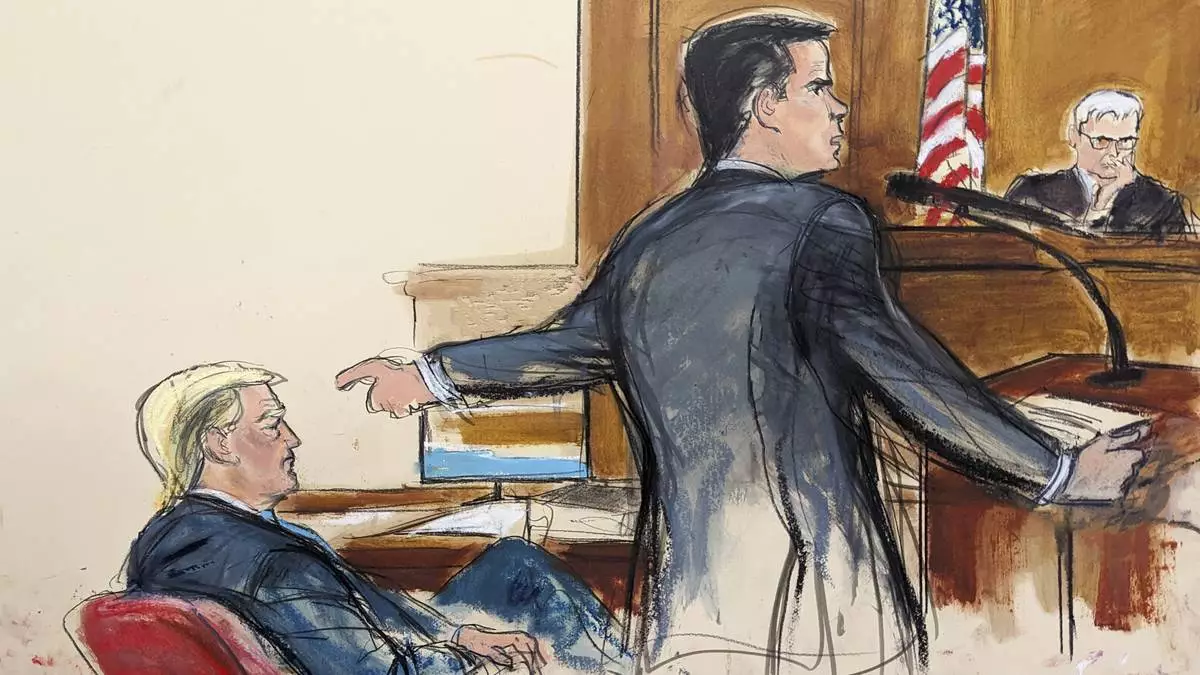
This artist depiction shows defense attorney Todd Blanche pointing at former President Donald Trump while giving his opening statement to the jury in Manhattan criminal court Monday, April 22, 2024, in New York. (Elizabeth Williams via AP)
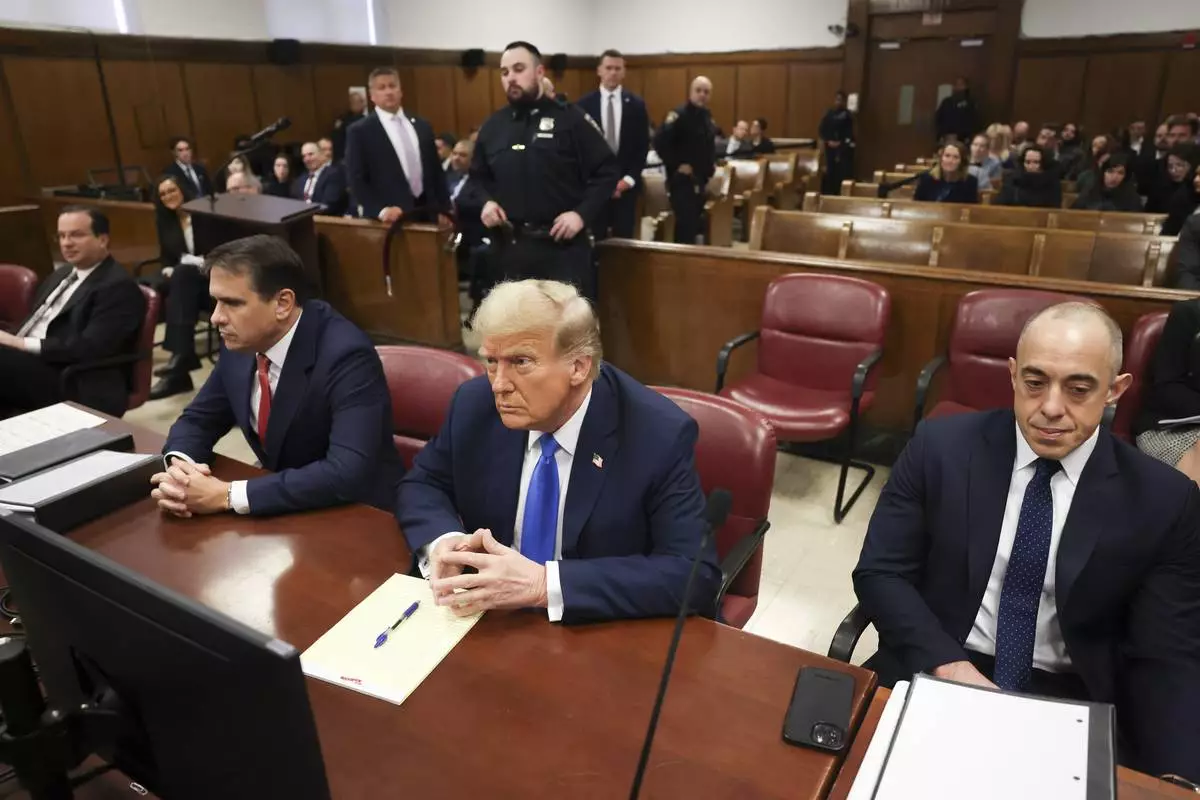
Former president Donald Trump, center, awaits the start of proceedings at Manhattan criminal court, Monday, April 22, 2024, in New York. Opening statements in Donald Trump's historic hush money trial are set to begin. Trump is accused of falsifying internal business records as part of an alleged scheme to bury stories he thought might hurt his presidential campaign in 2016. (AP Photo/Yuki Iwamura, Pool)








